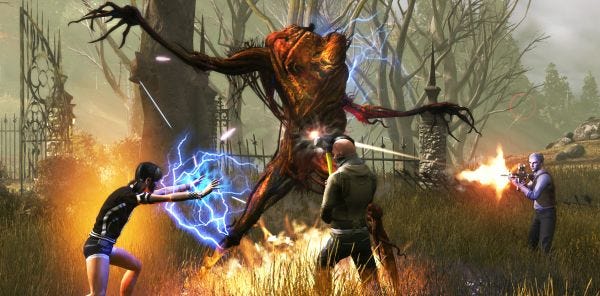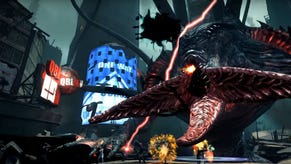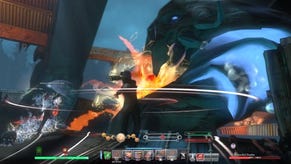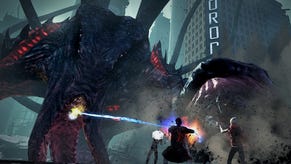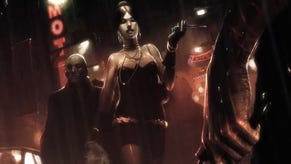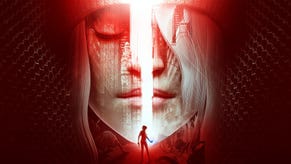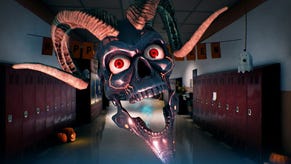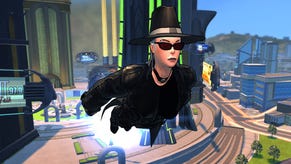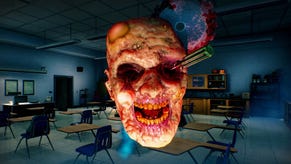Ragnar Tørnquist: The Secret World's Myths & Mechanics
Interview
Last week I sat down to play some The Secret World for the first time. But not before I'd chatted with project lead, Ragnar Tørnquist, in the rather creepy location of a 90th floor bedroom in a vast hotel suite. It's an interview in which he threatens to kill me. We also talk about how people are getting bored of MMOs, why the game has XP after all, and the role of religion in a game based on myths.
RPS: Do you think there's a danger people are getting bored of MMOs?
Ragnar: Genres don't have to be restricted to singular mechanics. If all racing games were like Ridge Racer, it would be extremely boring. There are so many racing games because they all have different approaches to it. But with MMOs, there's been just one approach. Some people dare to go in a different direction, like Guild Wars did that. EVE did that obviously. But they're few and far between. Especially when it comes to the big story-driven, open world MMOs. There's really only been class-based, level-based games that do things in a very predictable way. I'm kind of bored of MMOs as well, but I love playing The Secret World, simply because of the freedom you have in the game. It's really unmatched. The fact that you don't have to create alts, or don't have to lock yourself into anything. And of course the storytelling as aspect is what excites me the most about playing it.
RPS: Yeah, being you.
Ragnar: [laughs] Well obviously. Martin talks about crafting and I'm... [exhales]. The crafting looks good!
RPS: The crafting looks good!
Ragnar: It looks fantastic! So if you're into crafting, this is a dream system.
RPS: I hate crafting.
Ragnar: I hate crafting.
RPS: But, well, it obviously looks like Minecraft, and what a great idea. It looks like something I could intuitively do. Other MMOs, I find that if I can find a crafting bench, I'll find I don't have the things it wants, and...
Ragnar: You have to skill up, you have to grind.
RPS: So I say screw it, it loses my interest.
Ragnar: It doesn't seem to be designed for having fun, or for giving players any sort of flexibility. It's just designed to be a grind. But this is the opposite. You don't have to have any recipes or skill up, you just learn the patterns, get the materials, and do it.
RPS: Was there ever a point in development when you weren't going to have XP at all?
Ragnar: [thinks] Um... [thinks some more]. Maybe. I mean, we've been through so many iterations, and so many discussions about the system. I've probably spent 300 hours just sitting in rooms talking about the underlying RPG system. We've gone through a lot of different stages of it. So the answer is probably yes, at some point. I think at one point we went to the total extreme and said we'd have no classes or levels we ruined ourselves for a lot of the progression mechanics. But when we went into beta we learned that you do need good indicators of progression, because it's really hard for people to understand how well they're doing unless they have a number attached to it. So I think XP is a fundamental thing. It doesn't contradict the freeform character progression, or the no levels, no classes, because it reflects what you're doing in the game. The difference is you get XP from everything, from achievements, from lore, from PvP, from crafting.
RPS: But when you say no levels, I'm not sure if I can see the difference when you're getting XP to get better at something. Have you not just taken the number off?
Ragnar: No, not really. Because what we've done is let people progress in different ways. So you either specialise in something, like specialise in one weapon, work your way through that one slice in the ability wheel, or you can broaden yourself very early on, not get that sort of focused progression but a much wider one. It doesn't lock you down to one place, and I find that in level-based games, people are just racing for the top level. But we've got to a point where level doesn't matter. It's about finding your area of expertise, what you want to focus on. But even if it was just removing the number, it is a fundamental difference, especially as a player as I'm no longer just looking at one number - I'm looking at so many different things for my character. It feels different. But I think the lack of classes is more defining.
RPS: What is the solution for PVP, so I know who not to fight?
Ragnar: Well, I'm not the PVP guy, but there are definitely ways to make sure you get matched up with the right people. There's matchmaking, and there's the warzone, which is persistent, where players of any rank can go on. Although that's locked when you begin the game. You need a certain amount of XP before you're able to go in.
RPS: I've joked in the past, behind your back, that you can tell what TV shows Ragnar Tørnquist has been watching when he makes a new game.
Ragnar: Well, yes. But this draws much more on what I've been wanting to do for a very long time, rather than what I'm watching currently.
RPS: But you are influenced, and you're not embarrassed by that.
Ragnar: No no no, we do that openly.
RPS: So, the Filth in this game is a really huge part of it. It feels weird that you don't have Grant Morrison on board. It seems a really big thing to have used.
Ragnar: Well, we went through so many permutations of that name too, to illustrate this malevolent force from beyond. And I wouldn't say it's... it's probably inspired by his work, as well as inspired by the work he's inspired by. The Filth in our game - it is sort of a red thread or a black thread - a slimy black tentacly thread - through the game. But it's also something that's uniquely ours, and on the surface it may look like we're borrowing or copying from other people, but really it's just the surface. Once you scratch that, you'll find that there's a lot more to it. But yeah, we're never ashamed by what we're inspired by, and I think all good pop-culture spreaders are not afraid to wear their inspirations on their sleeves.
RPS: Do you think there's an absence of that in the games industry.
Ragnar: Yeah. Yes, especially modern pop-culture references. Sometimes they're done really badly. I mean, I think WoW is a great game, but sometimes you feel like the pop-culture references are just at odds with the rest of it. They feel misplaced. I think it can be badly handled, but when you have a real-world present day setting, it makes sense to do it. Our characters are aware of the world as well. We're not pretending we're in a separate dimension of reality where pop culture doesn't exist. We allow our characters to be fans of what we're fans of, and to reference things we reference. I'm tired of zombie movies where nobody ever says the word "zombie".
RPS: Even crime procedural TV shows exist in a bubble where...
Ragnar: ...no crime procedural TV shows exist. That seems to be the thing with a lot of pop-cultural things. They can reference outside of themselves, but never their own genre. Like zombie movies - nobody's ever seen a zombie movie in a zombie movie. But we are very aware of that, and we let our characters be in on it. It's not a joke - the game is not a joke, the story is not a joke - but they're in on the fact that events in the game might happen in pop culture that they've watched or read or seen.
RPS: Stuff like the Don't Look Now/Dark Water reference at the start of the Dragon story - is there a deeper philosophy of for that stuff, or is it simply so people who get it can feel good about getting it?
Ragnar: No, it's a philosophy. We're again tapping into that pop culture well. What we're actually saying is, all the stuff we read about and see in the world, it has to come from somewhere. So we're going to the source, and saying, this is where it came from. All those movies about scary little girls running around, where does that come from? The Dragon might actually be a source for that.
RPS: Ah, so you've flipped it on its head.
Ragnar: Exactly. Where does it come from? And that goes for all of our zombies and vampires and werewolves. We're representing it in a way that's familiar to people, but that's only to show that everything is true. These things that you see in movies and read in comic books - there's a source for them. And this is the source.
RPS: I asked you a couple of years ago, before people had seen the game or played it, whether you were nervous that by entering into this world of conspiracies, you may attract dangerous lunatics.
Ragnar: The wrong sort of people.
RPS: There's a certain type of person who's very attracted to this sort of thing, and if you're creating a game that's trying to take credit for it all...
Ragnar: The political conspiracies, that sort of thing, we're not touching that much on. We're much more about the occult conspiracies, the secret history of the world, rather than the "shadow government" controlling the US and having killed JFK - we don't address those things at all. I think the more people find out about the game, the less likely it's to be linked to those crazy websites where people are talking about 9/11 or Zionist conspiracies, or shit like that - that's not what our game's about. Our game's about the fact that there's been this secret world, this secret history that people are manipulating the world, on the occult side of things, rather than on the purely political or financial side of things.
RPS: What about religion?
Ragnar: Religion is definitely an aspect of the game. Our philosophy has always been that you should be able to look at the world of The Secret World, and that should fit with your religious or spiritual worldview. We're not trying to touch on that or interfere with it, but having said that, there are things that are going to pop up during the game that we're not going to show before launch - you may have seen some of them because you've seen too much...
RPS: That sounds like you're going to kill me!
Ragnar: [laughs] Well, you're not leaving this room. It's a long drop down from the 90th floor... Again, we don't want to mess with anyone's religious or spiritual worldview. We want to make sure it can fit into it. If you're liberal enough, obviously. This game could potentially offend a lot of people, but we've tried to step away from that. But at the same time there are going to be some links that will appear later on that might connect it to some religious worldviews.
RPS: Yes, because if you look at religion as mythology, and in your game all mythology is true, then it seems like it should be in there. But have you avoided that on purpose?
Ragnar: Yeah, we have avoided that on purpose. We don't want to tell people that what they believe in is just a fabrication made by the Dragons - that's not something we're aiming for. And we're also leaving the questions about good and evil, and whether God exists, up in the air. That fits into our setting. We have events in the game that can be interpreted as the work of some kind of divine entity, or not, if that is your point of view. We do have the idea of the ultimate destructive force in here, but that's on a much more cosmic than spiritual level.
RPS: A running theme through your games - well, perhaps not Casper, I'm not sure - has been faith. So how does faith apply in this game?
Ragnar: That's a good question. It is about mystery, I guess, much more than faith. And faith is mystery in a lot of sense - the belief in a greater mystery. There's very little need to believe in anything in this game, since everything's out there in the open. But there is actually - again I don't want to spoil things - but there is actually a through-line in the game that we haven't revealed that is about what are you going to put your faith in. What are you going to believe in? Whose voice are you going to listen to? And that's a theme that's going to carry past launch as well, where the players are hopefully going to be divided. What is the greater good of mankind? Who do you listen to at the end of the day. And that should lead to some interesting situations down the line. It's not simply three factions against each other, but it's much more on a general and ethical level about what is good for humanity. And that's what the game is about as well: each of these three secret societies that you join have a very different philosophy, but none of them really believe in saving every single individual. We're really pushing hard to make players question the motives of their secret society as well. They're doing some amount of good, but most of the stuff they're doing is completely selfish. Gaining XP is the ultimate selfish act in a game - you're doing everything for yourself, and doing stuff for your society, so they can get the upper hand. It is a question of how strongly do you believe in the tenets of your secret society, and how we're going to use that later down the line is going to be interesting as well.
RPS: Thank you for your time.
